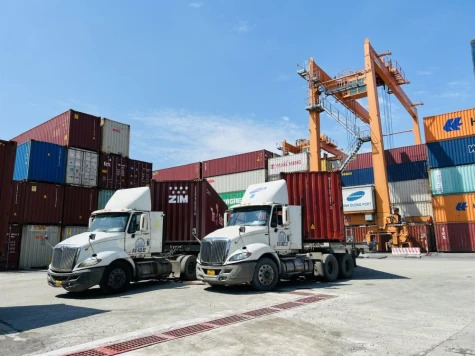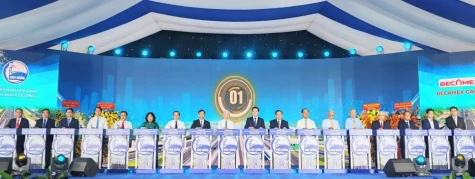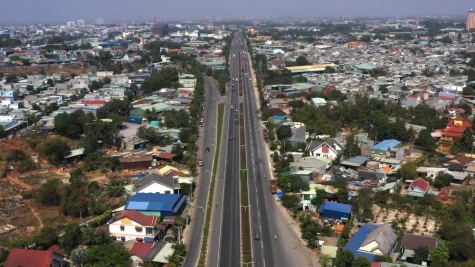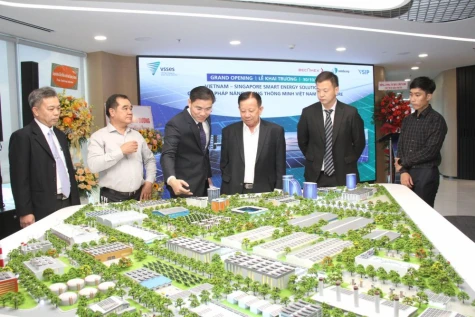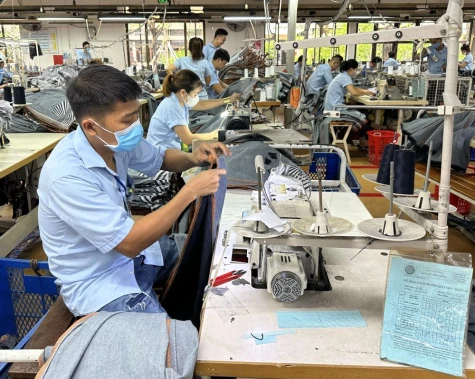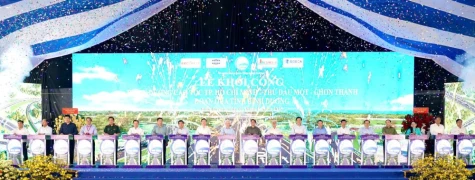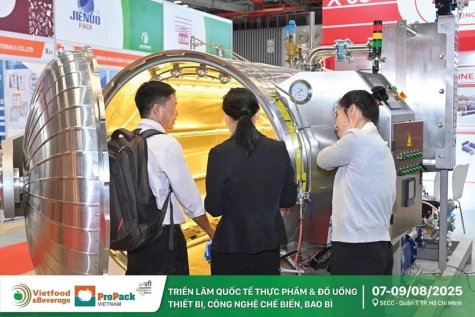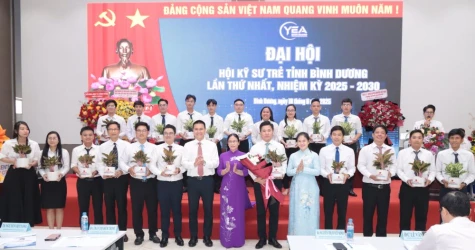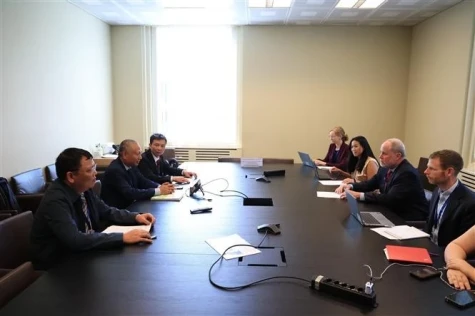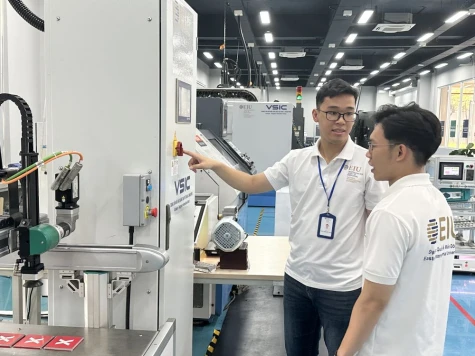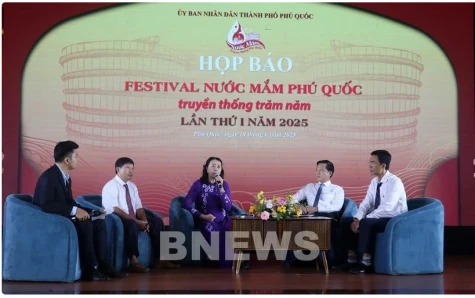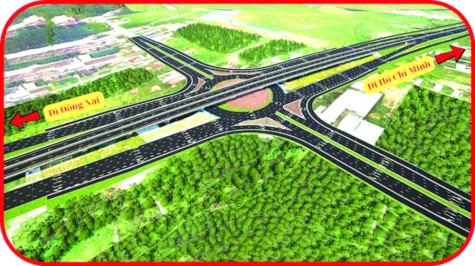Yesterday afternoon (June 18), Binh Duong Provincial People's Committee held a groundbreaking ceremony for the Ho Chi Minh City Ring Road 4 section through Binh Duong province, the groundbreaking ceremony for the Education - Training Complex of FPT Education Company Limited; and the inauguration of DT743, DT746, DT747B roads. At the same time, the Provincial People's Committee organized the handover of Provincial People's Committee's decision on approving investment policy of the concentrated information technology park and approving the investor to Becamex IDC Corporation; handover of Provincial People's Committee's decision on approving investment policy and approving the investor to THADICO Binh Duong Industrial Park Development Investment Company Limited - the investor of the project to invest in construction and business of infrastructure of the specialized mechanical industrial park.

Attending the ceremony were former President Nguyen Minh Triet, Deputy Prime Minister Mai Van Chinh; Mr. Vo Van Minh, Deputy Secretary of the Provincial Party Committee, Chairman of the Provincial People's Committee; Ms. Nguyen Truong Nhat Phuong, Vice Chairwoman of the Provincial People's Council; Mr. Bui Minh Thanh, Vice Chairman of the Provincial People's Committee; former provincial leaders; Mr. Le Truong Son, Vice Chairman of the Binh Phuoc Provincial People's Committee...
Promoting new era growth
At the groundbreaking ceremony, Deputy Prime Minister Mai Van Chinh highlighted the importance of investing in strategic infrastructure, particularly in transportation and information technology. He stated that such investments are crucial for achieving rapid and sustainable development. In recent times, infrastructure development across the country, including in Binh Duong province, has made significant progress, yielding valuable experiences and effective models. These improvements have confirmed the right direction in overcoming past limitations, setting a strong foundation for more efficient and economical future implementations.
The Ho Chi Minh City Ring Road 4 project is a national key infrastructure initiative, stretching approximately 207 kilometers, with the segment through Binh Duong province spanning 47.8 kilometers. It will feature eight expressway lanes and a design speed of 100 km/h. The project has been awarded to a consortium comprising the Industrial Development and Investment Corporation (Becamex Corporation), the Technical Infrastructure Development Joint Stock Company, and Deo Ca Group Joint Stock Company. |
The Deputy Prime Minister urged the current People's Committees of Binh Duong province and Ho Chi Minh City (effective after July 1, 2025) to direct investors, supervising consultants, and contractors to act with the utmost responsibility. They should ensure that projects are completed on schedule, with high quality, safety, and aesthetic standards. He called for central and local ministries to closely monitor the projects, proactively manage quality and progress, and resolve any challenges faced during implementation.
At the ceremony, Mr. Vo Van Minh, Deputy Secretary of the Provincial Party Committee and Chairman of the Provincial People's Committee, stated that the completion of the Ho Chi Minh City Ring Road 4 project in Binh Duong would connect with Ring Road 3 and the Ho Chi Minh City - Thu Dau Mot - Chon Thanh Expressway. This connection is essential for the circulation and transportation of goods, supporting socio-economic development by reducing traffic congestion, linking provinces and cities, and promoting the growth of satellite cities. It will expand new development spaces, stimulate industrial, urban, commercial, and service development, and enhance national defense and security in the southern key economic region, with Ho Chi Minh City as its nucleus. This project will also contribute to achieving the government’s target of 5,000 kilometers of expressways between 2021 and 2030.
Mr. Vo Van Minh emphasized that routes DT743, DT746, and DT747B have been fully invested in and inaugurated. These routes are crucial for regional and inter-regional connectivity. He noted that the mechanical engineering industrial park project has been a long-standing initiative of the Provincial Party Committee and Provincial People's Committee, with high expectations and is currently being carried out by a reputable and capable investor.
For the routes DT743, DT746, and DT747B, the total construction investment amounts to nearly 2,400 billion VND. These routes are important intra-provincial traffic axes that will help complete Binh Duong's modern traffic network. The mechanical engineering industrial park, covering an area of 786 hectares, has a total investment exceeding 75,000 billion VND. Once operational, it is expected to attract over 30,000 workers, of whom nearly 10,000 are anticipated to hold university degrees or higher. Construction is expected to begin in August 2025, with part of the project projected to be operational by September 2026.
Developing high-quality human resources and digital infrastructure
In the new era, Binh Duong province has identified three central pillars for development: advanced education, modern digital infrastructure, and an innovation ecosystem. These pillars are crucial for enhancing competitiveness, attracting high-quality investments, and fulfilling the vision of developing the Southeast region in the digital age.
The Education-Training Complex, currently under construction in Thai Hoa ward, Tan Uyen city, is a key project aligned with the local development orientation. It is expected to contribute significantly to the region's innovative education ecosystem, support human resource development, and improve digital infrastructure. Additionally, it will play a vital role in the implementation of the strategic quartet.
Deputy Prime Minister Mai Van Chinh emphasized that the project will benefit not only Binh Duong province and Ho Chi Minh City, starting from July 1, 2025, but will also provide high-quality human resources for the entire Southern key economic region. This region is leading the nation in attracting investment, driving exports, and transforming its growth model.
Deputy Prime Minister Chinh expressed confidence that the Education and Training Complex will become a hub for nurturing talent, disseminating knowledge, and inspiring the aspirations of Vietnam’s youth. It aims to meet the demands of national development in the contemporary era, adapting to the fourth industrial revolution along with the rapid advancement of digital technology and artificial intelligence. The goal is to elevate Vietnamese education and training to an advanced level in the Asian region by 2030 and to global standards by 2045.
Mr. Vo Van Minh, Deputy Secretary of the Provincial Party Committee and Chairman of the Provincial People's Committee, believes that once operational, the Education-Training Complex will not only supply high-quality human resources for the province but will also support the Southern Key Economic Zone. This aligns with the major objectives outlined in Resolution No. 57-NQ/TW of the Politburo, focusing on breakthroughs in science and technology development, innovation, and national digital transformation.
The project covers an area of over 84,000 m², with a total construction floor area of approximately 130,000 m². It will include lecture halls, dormitories, multi-purpose service areas, standard football fields, and other necessary facilities to fully accommodate the learning and living needs of students.
At the ceremony, a credit financing agreement was signed between Becamex IDC Corporation and two banks: Vietnam Joint Stock Commercial Bank for Industry and Trade (Vietinbank) - Transaction Office 2 and Vietnam Joint Stock Commercial Bank for Investment and Development (BIDV). |
Reported by Phuong Le - Translated by Ngoc Huynh








